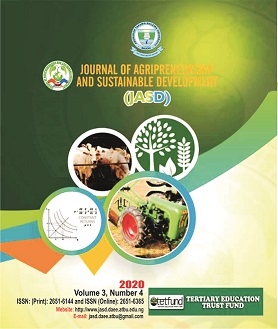IMPACT OF ADOPTION OF QUALITY PROTEIN MAIZE ON POVERTY STATUS OF RURAL FARMING HOUSEHOLDS IN NORTHWEST, NIGERIA
DOI:
https://doi.org/10.59331/jasd.v3i4.168Keywords:
Adoption, Households, Impact, Maize, Northwest, PovertyAbstract
The study assessed impact of adoption of quality protein maize (QPM) on rural poverty status of households in Northwest, Nigeria. The study collected data from 652 households using descriptive statistics; t-test, poverty decomposition, propensity score matching, average treatment effect, and potential outcome mean to analyze the data. The study found that about 29% - 31% (N351, 894 - N401, 658) of household expenditure goes to the purchase of food. It was equally established that 32% - 37% (N111, 878 - N141, 783) of household’s non-food expenditure was on cloth, transport, school fees and school materials. The average per capita expenditure poverty for farmers was N90.5 to N2863.60 per head per day. For farmers that do not adopt QPM, their current multidimensional poverty was 38% and had they choose to produce QPM, their multidimensional poverty index (MDPI) would be 34.7%. The current expenditure poverty status was 33% and had they choose to produced QPM, their expenditure poverty would be 61%. The study recommended increase in the publicity of QPM through bulletin, guide, and radio jingle in the study area.
Downloads

Downloads
Published
How to Cite
Issue
Section
License
Copyright (c) 2022 Journal of Agripreneurship and Sustainable Development

This work is licensed under a Creative Commons Attribution 4.0 International License.






